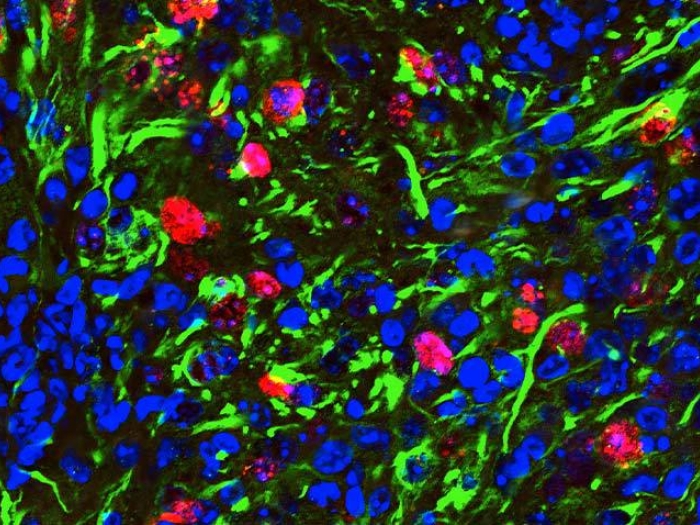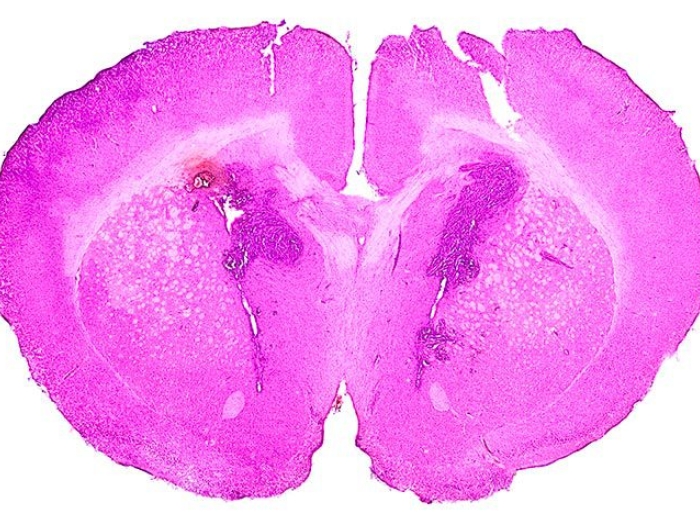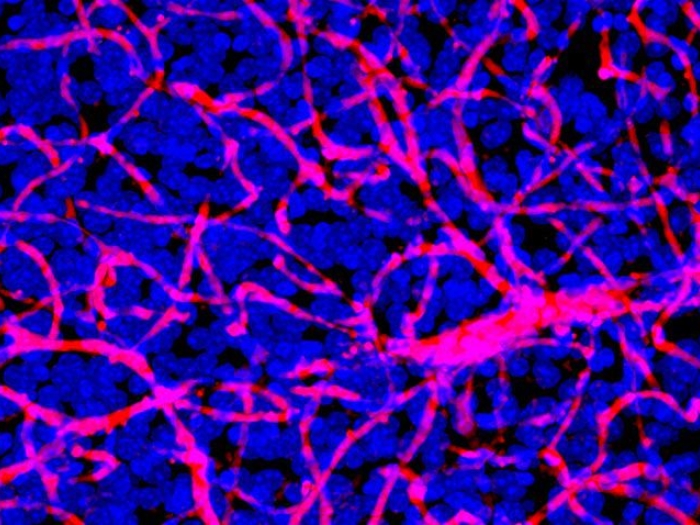Researchers have figured out how a specific metabolite controls the activity of DNA repair and how sensitive tissues are to cancer treatment
5:00 AM
Author |

Metabolites called nucleotides are the building blocks of DNA and can impact cancer’s sensitivity or resistance to chemotherapy and radiation in brain cancer.
Findings from researchers at the University of Michigan Health Rogel Cancer Center, published in Cancer Discovery, show how a specific nucleotide metabolite, called GTP, controls responses to radiation and chemotherapy in an unexpected way.
“We learned that if you increase a cell’s GTP levels, it makes it really resistant to radiation or chemotherapy. Lowering GTP levels, the cell becomes much more sensitive,” said Daniel Wahl, M.D., Ph.D., associate professor of radiation oncology at Michigan Medicine and senior author of this paper.
Researchers have long known that levels of nucleotides like GTP control how fast DNA damage is repaired, which in turn controls sensitivity to therapies.
Researchers previously thought that this only happened because nucleotides are the building blocks that form DNA. But these findings uncover an entirely new way that nucleotides control DNA repair.
“GTP impacts resistance or sensitivity to treatment not just because it’s a building block of DNA, as we previously thought,” Wahl continued.
“Instead of only affecting the physical structure of the DNA, it also acts as a signaler. The levels of GTP turn on a signaling pathway and give cells instructions to repair damaged DNA.”
What’s more, Wahl and collaborator Weihua Zhou, Ph.D., found this to be true for normal tissue in addition to cancer cells.
“It’s a generalizable finding,” said Zhou, research assistant professor of radiation oncology and first author of the study.
“In the future, we’d like to develop therapeutics that leverage the relationship between GTP and DNA damage response, both to make cancer cells more sensitive to chemotherapy and radiation and also to boost GTP levels to protect normal tissue from damage.”
Wahl and a team of researchers have an ongoing clinical trial for patients with brain cancer focused on the role of GTP in treatment responses.
Wahl says these findings are fundamental biologic discovery that translates into clinical applications for this trial and potential future trials.
“We knew that depleting GTP might make brain cancers respond better to chemotherapy and radiation. Now these findings show why that's happening,” Wahl said.
The discovery that GTP acts as a signaler helps explain the biological underpinnings of why focusing on GTP is a worthwhile pursuit and could help researchers figure out which patients will derive the most benefit from GTP modulators in the clinical trial.
“When the signaling pathway is active, the cancer is resistant to radiation and chemotherapy,” Wahl continued. “These findings might help us select the right patients for the next line of clinical trials.
Additional authors: Zitong Zhao, Angelica Lin, John Z Yang, Jie Xu, Kari Wilder-Romans, Annabel Yang, Jing Li, Sumeet Solanki, Jennifer M Speth, Natalie Walker, Andrew J Scott, Lu Wang, Bo Wen, Anthony Andren, Li Zhang, Ayesha U Kothari, Yangyang Yao, Erik R Peterson, Navyateja Korimerla, Christian K Werner, Alexander Ullrich, Jessica Liang, Janna Jacobson, Sravya Palavalasa, Alexandra M O’Brien, Ameer L Elaimy, Sean P Ferris, Shuang G Zha, Jann N Sarkari, Balázs Győrffy, Shuqun Zhang, Wajd N Al-Holou, Yoshie Umemura, Meredith A Morgan, Theodore S Lawrence, Costas A Lyssioti, Marc Peters-Golden5, Yatrik M Shah
Funding: Forbes Institute for Cancer Discovery; NCI (R37CA258346, K08CA234416, F32CA260735, R01CA240515. R37CA237421, R01CA248160, R01CA244931, R35HL144979, R01CA148828, R01CA245546, and R01DK095201); NINDS (R01NS129123); Damon Runyon Cancer Foundation; the Sontag Foundation; the Ivy Glioblastoma Foundation; Alex’s Lemonade Stand Foundation; the Chad Tough Defeat DIPG foundation. Emerging Scholars program of the Taubman Institute via a gift from William Parfet; University of Michigan Medical School Pandemic Research Recovery grant (U083054); Crohn’s and Colitis Foundation Research fellow award (623914); DP2 OD030734; National Research, Development and Innovation Office (RRF-2.3.1-21-2022-00015, TKP2021-NVA-15); UMCCC Core Grant (P30CA046592); NIH (R35HL144979). and UMCCC Core Grant (P30CA046592).
Disclosures: D.R.W has received consulting fees from Agios Pharmaceuticals and Innocrin Pharmaceuticals and is an inventor on patents pertaining to the treatment of patients with brain tumors (U.S. Provisional Patent Application 63/416,146, U.S. Provisional Patent Application 62/744,342, U.S. Provisional Patent Applicant 62/724,337). S.G.Z reports unrelated patents licensed to Veracyte, and that a family member is an employee of Artera and holds stock in Exact Sciences. M.A.M gets research support and honoraria from AstraZeneca. No disclosures were reported by the other authors.
Paper cited: “GTP signaling links metabolism, DNA repair, and responses to genotoxic stress,” Cancer Discovery. DOI: 10.1158/2159-8290.CD-23-0437/729826

Explore a variety of health care news & stories by visiting the Health Lab home page for more articles.

Department of Communication at Michigan Medicine
Want top health & research news weekly? Sign up for Health Lab’s newsletters today!





